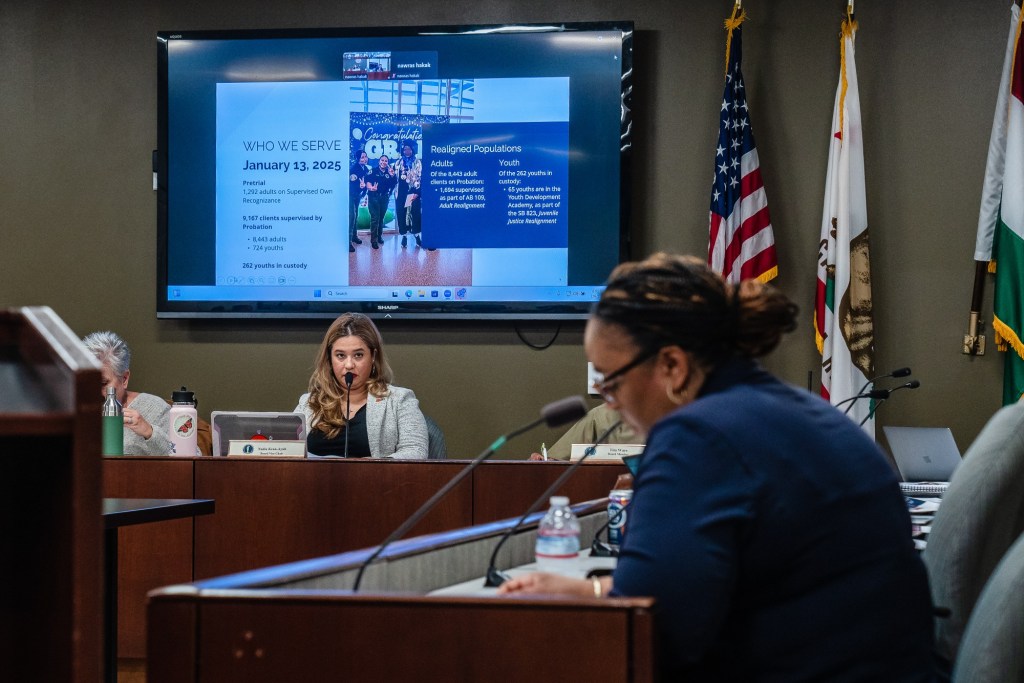
Thursday evening was the first time San Diego County’s probation chief attended a meeting of the board charged with investigating allegations of misconduct against her officers.
Members of the Citizens Law Enforcement Review Board, also known as CLERB, peppered Tamika Nelson with questions about programs available to people under probation supervision, the use of body cameras and whether officers received training on working with neurodivergent youth in county custody.
Not asked was why Nelson’s department only recently began notifying CLERB about serious injuries to juveniles detained in county facilities, despite a years-old rule requiring that information about such incidents be turned over to CLERB investigators.
According to a recent CLERB workload report — a document the review board uses to track open cases — last year there were 28 instances in which a youth suffered great bodily injury during an interaction involving a probation officer.
Probation spokesperson Chuck Westerheide said the cases did not necessarily involve improper use of force; more likely, the injury happened when a probation officer or officers were trying to break up a fight.
“The cases reported to CLERB involve great bodily injury to youth in which an officer physically intervened at some point,” he said. “A youth’s injury could be self-inflicted, caused by other youth or the result of staff actions taken during intervention. Although the cases reported to CLERB involved staff intervention, the youths’ injuries were not necessarily caused by that intervention.”
Westerheide said probation defines “great bodily injury” as “a significant or substantial physical injury including, but not limited to, a bodily injury that involves a substantial risk of death, unconsciousness, protracted and obvious disfigurement, or protracted loss or impairment of the function of a bodily member or organ.”
Of the 28 cases, all of which have “Doe” in the name field, six happened at the county’s Youth Transition Center in Kearny Mesa and 22 at the East Mesa Juvenile Detention Facility in Otay Mesa.
The cases were filed under a CLERB rule that took effect in January 2021, giving the board authority to investigate any use of force by “peace officers or custodial officers employed by the County Sheriff’s Department or custodial officers employed by … the Probation Department resulting in great bodily injury.”
Paul Parker, CLERB’s executive officer when the rule took effect, said both departments agreed to send a list of incidents each month.
“The Sheriff’s Department was really good about providing information about great bodily injuries,” he said. But the Probation Department provided no such information. Parker said he met with Nelson about this, but the department still failed to turn over records.

It’s unknown why, late last year, the Probation Department notified CLERB about the 28 great bodily injury cases. Westerheide, the probation spokesperson, did not provide a response to this question.
For now, CLERB has only the most basic information about each case, said the board’s executive officer, Brett Kalina, because, also late last year, probation officials challenged the board’s ability to subpoena records involving juveniles.
“A request for records was submitted to the Probation Department,” says CLERB’s October findings report. “CLERB received a response from the Probation Department via counsel, objecting to the request on several legal grounds. As a result, CLERB has not received any records for this matter.”
The report goes on to say that CLERB’s legal counsel disagreed with the Probation Department’s interpretation of the state law that limits the disclosure of information about juveniles.
Parker said the review board had a standing order, renewed every three years, with the Juvenile Court that allowed the Probation Department to release records to CLERB investigators.
“Because this court order existed, we could get what we wanted,” he said.
Kalina told the Union-Tribune last week that probation officials decided the standing order was not valid.
Going forward, CLERB will need to file a petition with the court for any cases involving a juvenile under probation supervision.
Kalina said he doesn’t know how long each petition will take.
Complaints to CLERB about misconduct involving a probation officer are rare, though CLERB findings over the past two years reflect an uptick in complaints stemming from incidents at juvenile detention facilities.
In March 2023, CLERB found that probation officers at the Youth Transition Campus failed to conduct appropriate safety checks the night 16-year-old Alan Arguelles died from a fentanyl overdose.
Staff members were not conducting “proof of life” checks every 15 minutes as state regulations and department policy both require, CLERB investigators found.

In August, San Diego County agreed to pay $1.1 million to settle a wrongful death lawsuit filed by Arguelles’ mother, Brenda.
CLERB findings from June 2023 show that a woman identified as “Veronica B” submitted a complaint on behalf of her son, alleging that while he was detained at the East Mesa Juvenile Detention Facility, a probation officer used profanity against him, dared the boy to hit him and placed his knee on the boy’s neck.
The board voted to sustain the profanity finding but determined there was not enough evidence to prove or disprove the other allegations.
Last May, the board found that two probation officers used excessive force against a developmentally disabled boy housed at the Youth Transition Campus.
One officer grabbed the boy’s head and “smashed it down on the concrete floor,” says CLERB’s summary of the case. The case summary mentions that the officer no longer works for the county.
Sharon Kalish, the boy’s mother, filed the complaint. She testified to the review board that her son was unable to process what he was being told by officers.
CLERB’s October agenda included two more cases involving incidents at East Mesa.
The first, filed by board Chair MaryAnne Pintar on behalf of a complainant who asked to remain anonymous, alleged that a probation officer repeatedly used the N-word and showed explicit films to boys, stopping a film when a naked woman appeared on screen and shouting “See, look at that!”
The summary of the incident notes that another officer considered documenting the violations but did not out of fear of retaliation. Probation officials later informed CLERB that the officer had retired.
CLERB was forced to close the case after probation officials declined to turn over records.
A second complaint, filed by Yusef Miller, executive director of the North County Equity & Justice Coalition, was dismissed for a different reason. Miller filed the complaint following news reports about four possible overdoses at the East Mesa facility.
Probation officials said Miller did not have firsthand knowledge of the incident and the allegations were insufficient. They also insisted that the hospitalizations did not involve drugs.
At last week’s CLERB meeting, Miller said he remains concerned about the incident and has unsuccessfully tried to meet with probation officials. His concern was echoed by Paloma Serna, who has become an advocate for safer custody standards after her daughter, Elisa, died in 2019 in Las Colinas women’s jail in Santee.
“Here you have about 28 use-of-force (incidents) resulting in great bodily harm,” she said. “This is very concerning. We need more information about what is not working in the probation department.”






